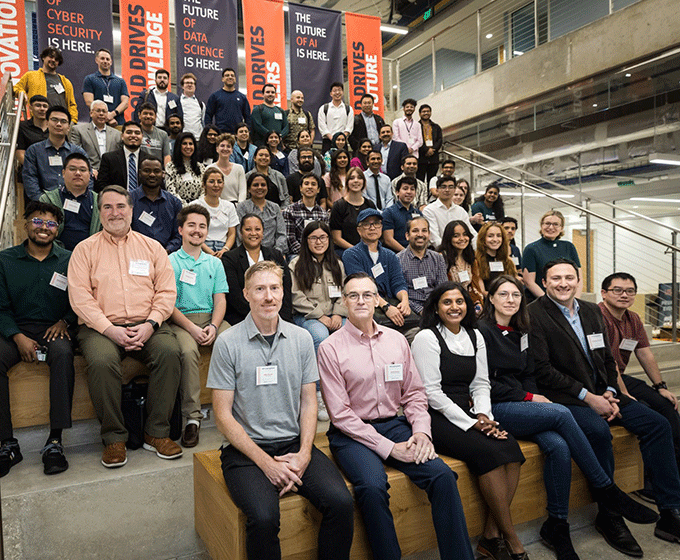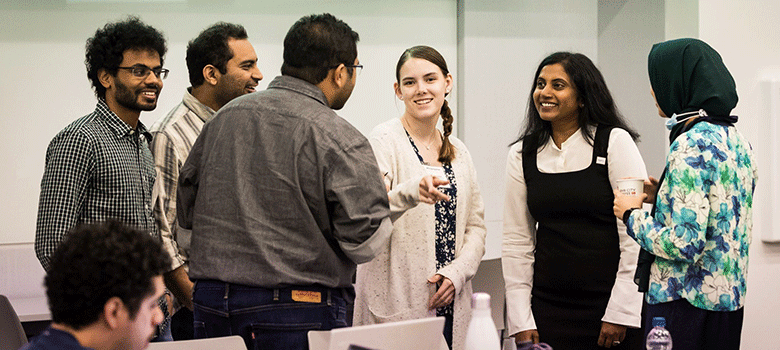
MARCH 5, 2024 — Leading artificial intelligence researchers, industry leaders and students are gathering at the first NSF AI Spring School this week to develop the next generation of workforce talent.
The UTSA Matrix AI Consortium for Human Well Being is hosting the event, as part of the ExpandAI partnership between UTSA and the AI Institute for Edge Computing Leveraging Next-Generation Networks (ATHENA). The week-long initiative will focus on upscaling established research and education programs at UTSA and showing students the wide variety of careers open to them in AI.
“We are trying to reduce entry point barriers for students,” said Dhireesha Kudithipudi, the McDermott Endowed Chair in the Department of Electrical and Computer Engineering at UTSA and founding director of MATRIX AI. “The idea is to strengthen our AI research capacity, specifically in the area of neuro-inspired AI, which is one of the strengths we are building at UTSA. We want to provide an opportunity to our students to experience the full stack of AI technologies, tools and use cases in this realm. We want them to know they can make a difference in the big field of AI with a graduate education at UTSA.”
James Donlon, program director at NSF, provided keynote remarks at the event, emphasizing the transformative potential of collaborative partnerships on a national scale.

Dhireesha Kudithipudi (second from right), founding director of Matrix AI, chats with students at UTSA's San Pedro I building.
Over 100, participants at the Spring School are exploring neuro-inspired AI. MATRIX AI faculty, visiting faculty from Duke University and students are presenting introductory talks on AI applications and their research. The effort is also fostering innovation and collaboration in the realm of AI research and development between institutions.
The program is supported by a team of MATRIX thrust leads and co-principal investigators, including Panos Markopolous, Gabriela Ciocarlie, Murtuza Jadliwala, Amina Qutub, Fidel Santamaria, and Itamar Lerner.
Markopoulos, Klesse Endowed Professor in the UTSA Department of Electrical and Computer Engineering, is introducing attendees to federated learning, a training approach where one main model is taught on different devices or servers spread out across different locations. Markopoulos’ research focuses on tackling the problems in the realms of machine learning, data analysis and signal processing.
“UTSA is on a very good growth trajectory in areas of AI, and this is a chance for someone like me to join and contribute to those steps forward,” Markopoulos said. “This week is a great opportunity for undergraduate students or early graduate students that do not have much experience in AI yet but want to get to know about and consider it part of their future careers.”
UTSA doctoral student Tej Pandit became curious about AI while attending a similar seminar in the past. This week, he will be among the presenters sharing his research. He is drawing inspiration from the brain to enhance the development of AI applications. Among his work, Pandit is training AI algorithms to adapt and perform operations in natural disasters.
Pandit hopes to ignite the same curiosity in other students who will attend the NSF AI Spring School.
“Today, people get to see these technologies. We have chat bots like ChatGPT, where they get to see the problems with technologies because they’re able to use them. They get to directly interact with AI. Students can now see the technology that drives AI, that they’re using every day, and the problems with the technology because they get to directly interact with them. They can run their minds and discover that they can help solve these problems,” Pandit said.
The Spring School is running this week through Friday, March 8.
UTSA Today is produced by University Communications and Marketing, the official news source of The University of Texas at San Antonio. Send your feedback to news@utsa.edu. Keep up-to-date on UTSA news by visiting UTSA Today. Connect with UTSA online at Facebook, Twitter, Youtube and Instagram.
Move In To COLFA is strongly recommended for new students in COLFA. It gives you the chance to learn about the Student Success Center, campus resources and meet new friends!
Academic Classroom: Lecture Hall (MH 2.01.10,) McKinney Humanities BldgWe invite you to join us for Birds Up! Downtown, an exciting welcome back event designed to connect students with the different departments at the Downtown Campus. Students will have the opportunity to learn about some of the departments on campus, gain access to different resources, and collect some giveaways!
Bill Miller PlazaJoin us for an intimate evening of cocktails, conversation, and culinary inspiration with Pati Jinich, Emmy-nominated chef and James Beard Award-winning author. Enjoy light bites and signature drinks in the warm, modern setting of Mezquite as Pati connects with guests over her passion for Mexican cuisine and storytelling.
Mezquite Restaurant in Pullman Market, 221 Newell Ave., San Antonio 78215From inspired courses to thoughtful pairings and a rich sense of community, the Ven a Comer Signature Dinner is a night of shared meals, shared stories, and unforgettable flavor.
Stable Hall (Pear Brewery), 307 Pearl Pkwy, San Antonio 78215Come and celebrate this year's homecoming at the Downtown Campus with food, games, giveaways, music, and more. We look forward to seeing your Roadrunner Spirit!
Bill Miller PlazaThe University of Texas at San Antonio is dedicated to the advancement of knowledge through research and discovery, teaching and learning, community engagement and public service. As an institution of access and excellence, UTSA embraces multicultural traditions and serves as a center for intellectual and creative resources as well as a catalyst for socioeconomic development and the commercialization of intellectual property - for Texas, the nation and the world.
To be a premier public research university, providing access to educational excellence and preparing citizen leaders for the global environment.
We encourage an environment of dialogue and discovery, where integrity, excellence, respect, collaboration and innovation are fostered.